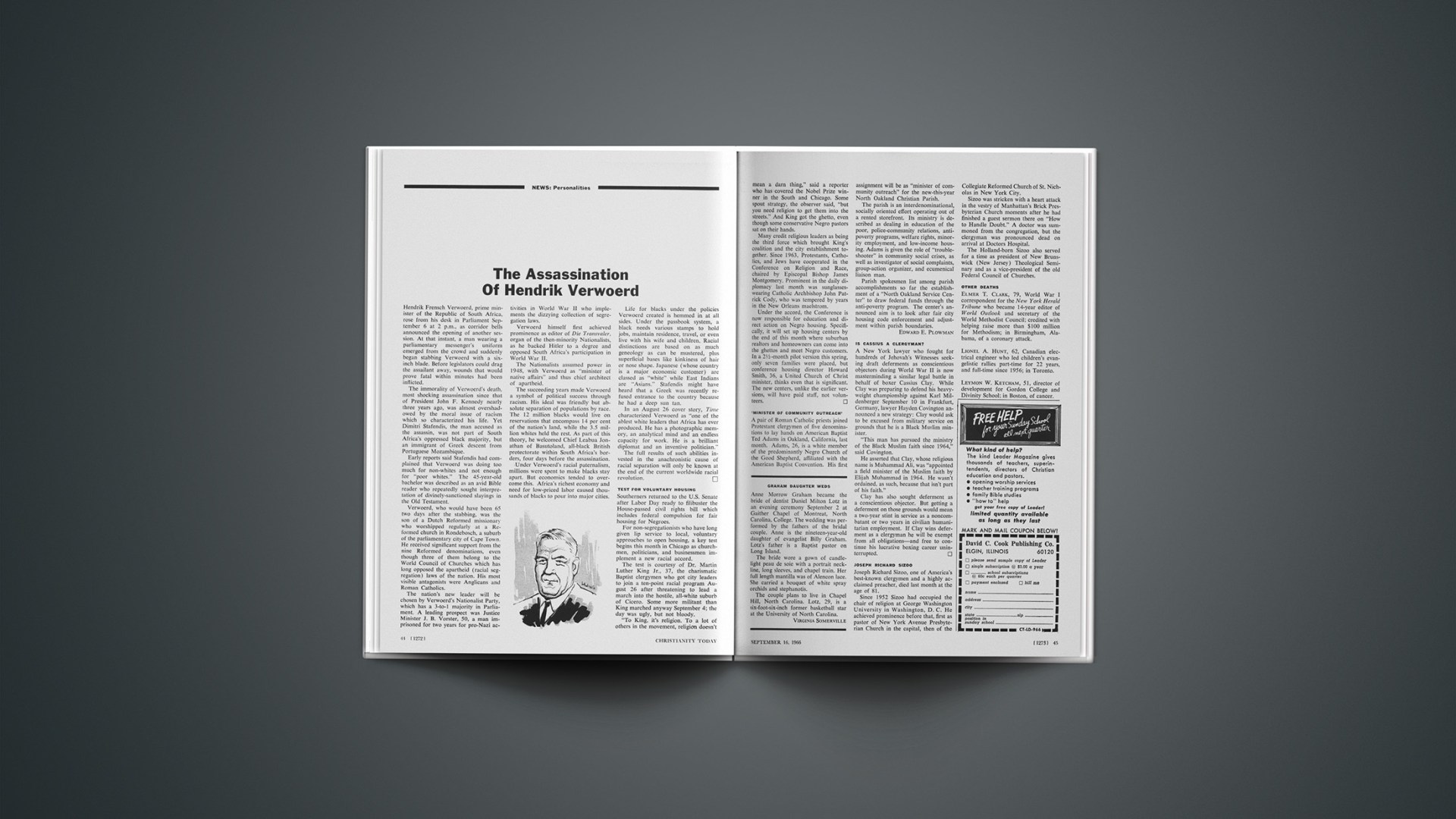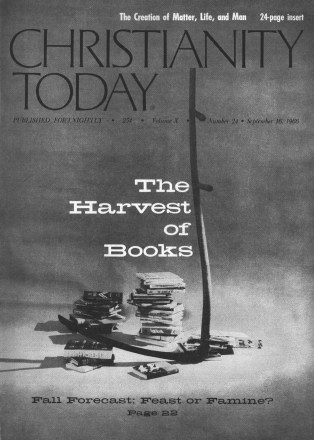That unjustly neglected philosopher Sam Weller knew the secret of correspondence. “That’s rather a sudden pull up, ain’t it, Sammy?” inquired his father on one memorable occasion. “Not a bit on it,” answered Sam; “she’ll vish there was more, and that’s the great art o’ letter writin’.” Our affluent age has seen the letter demoted to a utilitarian device or a tiresome Sunday afternoon chore (lovers excluded, of course). The situation has never been more devastatingly put than by an Oxford don: “Perhaps one of the reasons why letters are so hard to write and so much harder to read is that people … think nothing worth writing except what would not be worth saying.”
The don was C. S. Lewis, the occasion ironically a letter to his brother in 1921. That same brother, W. H. Lewis, has now edited a selection of the Letters of C. S. Lewis (London: Geoffrey Bles Ltd., 30s.) and appended a memoir. The period covered is 1915–1963, during the first part of which time Lewis had not surprisingly wandered away from what his brother calls “the dry husks of religion offered by the semi-political church-going of Ulster.”
Most one-sided correspondences tend to exasperate, but what C. S. himself had done so well in Screwtape and Letters to Malcolm has been creditably emulated in this volume; we echo the Wellerian wishing for more. The man who held that his friends, books, and brains were “not given me to keep” shared his joys and sorrows, his wisdom and his caring, with people of all kinds, and did it with a unique combination of logic, imagination—and tact.
He was eminently sensible. With crushing simplicity he points out that psychoanalysis, like every young science, is prone to error, “but so long as it remains a science and doesn’t set up to be a philosophy, I have no quarrel with it.” To an unnamed lady (he, like Samuel Rutherford, had many feminine correspondents) he writes advising her to steer clear of non-Christian psychiatrists—“they start with the assumption that your religion is an illusion and try to ‘cure’ it: and this assumption they make not as professional psychologists but as amateur philosophers.”
Part of C. S. Lewis’s universal appeal surely lay in the fact that he defied precise analysis; he belonged to no theological party; his views were never inhibited by potential heresy-hunters. His reputation in religious circles was dependent neither upon the silence of his intimates nor upon his not being asked certain questions. Lewis never hedged. A straight question brought a straight answer—if he didn’t know he’d say so.
His logical faculty was in the more-precious-than-rubies category. To a Roman priest in India he writes that his correspondent’s Hindus sound delightful, “but what do they deny?” This is precisely what many of us find lacking in liberal Christian utterances today: that, in Lewis’s words, “truth must surely involve exclusions.” Now this bears pondering. Admirable sentiment though it was if one didn’t wait to define terms, Edwin Markham’s all-embracing tolerance drew a circle that took in too much.
One of the least publicized and most dangerous heresies of our times whispers engagingly that heresy is dead. Lewis had no truck with this line of thought. He was openly contemptuous of the German radicals (as he would have been of their American stepchildren); dismisssed with the merest side-glance “the poor Bishop of Woolwich”; and failing to see Teilhard de Chardin’s merit, suggested that “the enormous boosts” he got from anti-Roman Catholic scientists resembled “the immense popularity of Pasternak among anti-Communists.” Early in 1940 a letter to Dom Bede Griffiths prophesied the development of “both a Leftist and a Rightist pseudo-theology.”
Lewis is critical also of some aspects of Protestantism which demand that the salvation of others should conform to some ready-made pattern. “They have a whole programme of conversion, etc. marked out, the same for everyone, and will not believe that anyone can be saved who doesn’t go through it ‘just so.’ But … God has His own way with each soul.” It might have been Von Hügel speaking (“souls are never dittoes”).
But Lewis rejected one extreme as well as the other. He told Sherwood Wirt, “The Lord has a habit of bringing people into His Kingdom in ways that I specially dislike; therefore I have to be careful.” He took little account of different brands of churchmanship; to him the real distinction was between “religion with a real supernaturalism and salvationism on the one hand, and all watered-down and modernist versions on the other.”
This is not to say that Lewis’s theology can be swallowed whole. Some of us simplify because of mental sloth or incapacity; he slipped into it understandably now and then, perhaps in adapting himself to the intellectual level of his correspondent, perhaps to underline a point. One of them he tells that “no amount of falls will really undo us if we keep on picking ourselves up each time.… The only fatal thing is to lose one’s temper and give it up.” F. W. H. Myers was saying much the same thing a century ago in Saint Paul, but his “God shall forgive thee all but thy despair” suggested he was a better poet than theologian.
In lesser ways these Letters reflect what to some is unorthodoxy. Smoking he admitted he found hard to justify, but for him “not smoking is a whole time job.” Those churches that made teetotalism a condition of membership were guilty of a “tyrannic and unscriptural insolence.” Lewis blamed the seventeenth-century Puritans “who first made the universal into a rich man’s luxury.’
This volume shows a characteristic tongue-in-cheekiness. To Dorothy Sayers, Lewis writes, “A doctrine never seems dimmer to me than when I have just successfully defended it. Thirty-five years ago he offered a definition of God quoted here: “a being who spends His time in having His existence proved and disproved.” He never visited America but loved its sons and daughters. Henrietta Mears called on him and they hit it off at once. He chose Sir Walter Scott for leisure reading but recognized that history to Scott meant “the stories remembered in the old families.” It takes a courageous Englishman to pronounce on anything Scottish—and a courageous Scot to say he is absolutely right!
He wrote Out of the Silent Planet partly because of the fallacy that a “scientific” hope of defeating death was a real rival to Christianity. Even his flights into science fiction were essentially homiletical. “Any amount of theology can now be smuggled into people’s minds under cover of romance without their knowing it,” he wrote.
Increasing infirmity brought no decrease in his mental agility. Two months before his death we find him writing, “Ought one to honour Lazarus rather than Stephen as the protomartyr? To be brought back and have all one’s dying to do again was rather hard. “Nothing could be less Rhodes-ian as the end approached than some words to his brother: “I have done all I wanted to do, and I’m ready to go.” That’s the sort of peace at the last I would gladly settle for.
J. D. DOUGLAS










